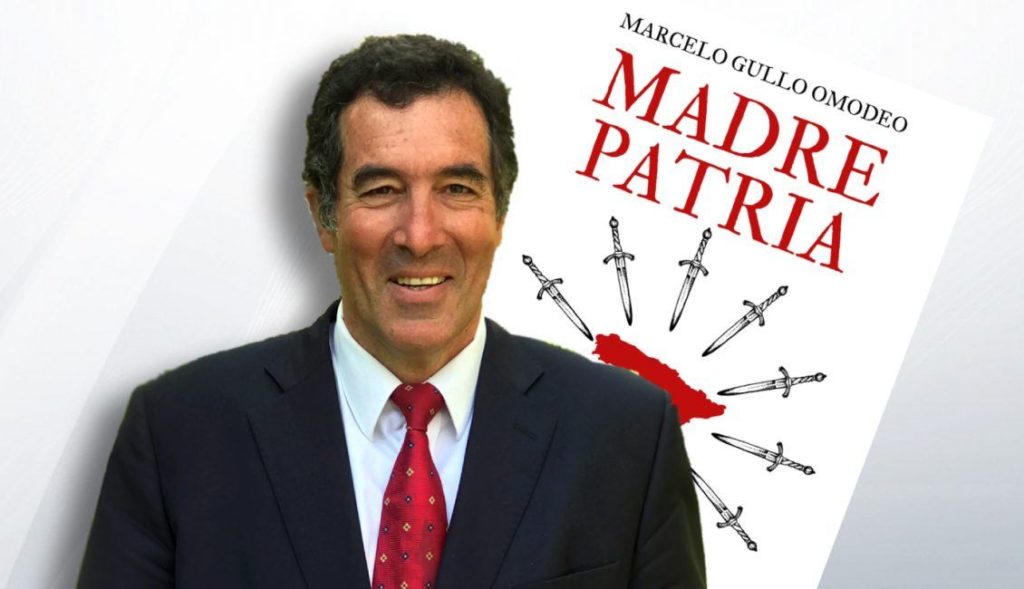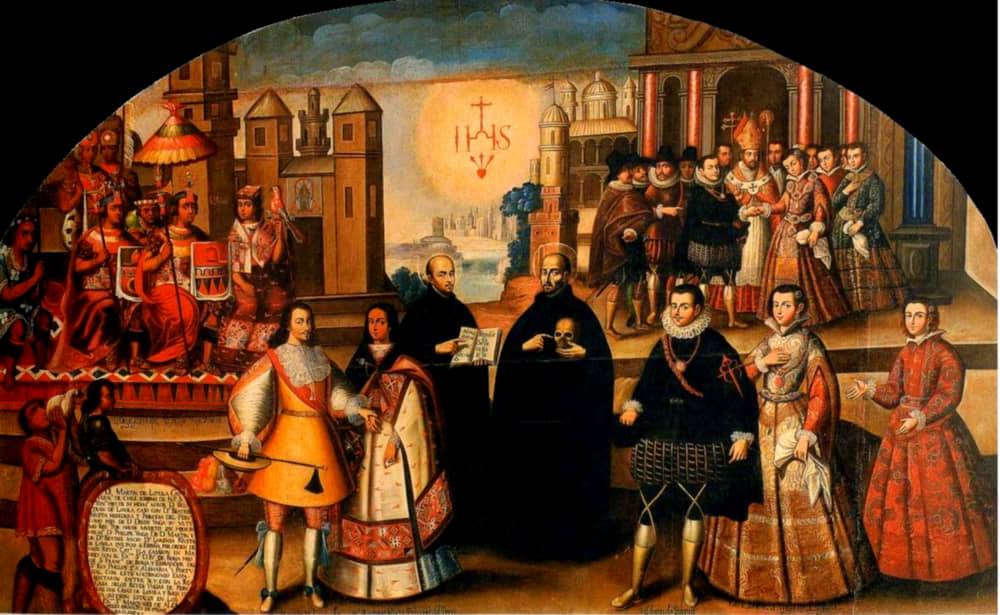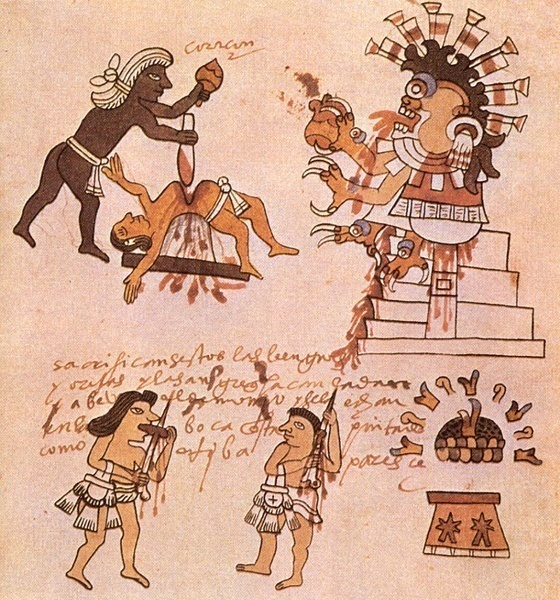This wide-ranging conversation with Marcelo Gullo Omodeo, the Argentine academic, analyst and consultant in international relations, is a great pleasure and honor to bring to our readers. His most book, Madre Patria (Motherland), effectively analyses the devastating impact that the Black Legend has had on the great achievements of Spain in the Americas, a period now disparagingly known as “colonialism.” He discusses his book with Javier R. Portella, the publisher of the journal El Manifesto.
Javier R. Portella (JRP): “Motherland,” “Motherland”…. What memories the beautiful title of your wonderful book brings back. Memories of childhood, of school… Memories of youth… No, not of youth. Even then, the word was beginning to disappear from our heritage. Little by little, the very idea of homeland was wrapped in the rancid dust of contempt. Eventually motherland and fatherland disappeared from the map. No one in Spain today would utter these two words. And in that Hispanic America which, in order not to call it so, is called—or worse, we call it that—”Latin,” “motherland” it still uttered. Is Spain still thought of as the Motherland? I have heard the expression in Argentina and somewhere else, it is true. But I am afraid that…
Marcelo Gullo Omodeo (MGO): There was lots of talk about it, my dear Javier, and then there was even more talk. The homeland is always the “being” where “being” develops its existence. Our being is America; but our being was given to us by Spain. That Spain that had been for centuries—and is again today—a “being” that is in danger, always threatened by extinction—first against the subjugating Muslim imperialism and then against the Balkanizing Anglo-Saxon imperialism.
Numerous men of letters, such as the Uruguayan José Enrique Rodó, the Argentines Manuel Ugarte and Manuel Gálvez, the Mexican José Vasconcelos, the Peruvian Enrique Santos Chocano, numerous politicians, such as the Uruguayan Luis Alberto de Herrera, the Peruvians Víctor Raúl Haya de la Torre and Luis Alberto Sánchez, the Colombian Eliecer Gaitan, the Argentines Roque Saenz Peña, Hipolito Yrigoyen, Juan Domingo Peron, the legendary Evita, but above all the vast majority of the Argentine and Latin American people, mainly its humblest sectors, felt Spain as our Motherland. I still remember Luzmila Méndez Ramírez, a humble and knowledgeable woman of Indian race whose mother-tongue was Quechua, born deep in the Peruvian highlands, who struggled all her life, being always a domestic servant, telling me, one October 12, while watching on television the demonstrations of the young people of Lima repudiating Spain: “Don Marcelo, they are wrong, Spain is our Motherland.”

Allow me to quote one of Eva Perón’s most moving speeches about Spain and the conquest of America:
“The epic of the discovery and conquest is, fundamentally, a popular epic. We are, then, not only legitimate children of the discoverers and conquerors, but direct heirs of their deeds and of the flame of eternity that they carried over the seas. October 12 is, for the same reason, a celebration of Hispanic culture, which touches Spain as well as its daughters in America. Let us fight as the men of Cortés, Mendoza, Balboa and Pizarro knew how to fight. This is my tribute to Columbus Day, the day of the people who gave us our being and bequeathed us their spirituality. May they be blessed!”
These words of Evita say it all.
In 1927, in the tango La gloria del águila, an emotional Carlos Gardel calls Spain “Madre Patria querida de mi amor” (Dear Motherland of my love). That was the feeling of the majority of the Argentine and Latin American population, before the “Black Legend” poison (through the cultural propaganda made by the “globalist left,” whose most important political expression today in Argentina is Kirchnerism) penetrated the spirit of the youth.
JRP: I am going to ask you something a little difficult perhaps, since there are many and substantial things in your book. I would like to ask you to summarize for me, concisely, the core, the essence of your defense of Spain and your plea against the Black Legend.
MGO: Spain’s defense can be summarized in a single sentence: Spain did not conquer America, Spain liberated America. In reality there was no conquest, but rather the liberation of America—as the Mexican Vasconcelos affirms—from “all that rank yerba of the soul which is the cannibalism of the Caribs, the human sacrifices of the Aztecs, the stultifying despotism of the Incas.”
In my work, Madre Patria (Motherland), making an objective analysis of history, I demonstrate in a simple but scientific way that Hernán Cortés did not conquer Mexico. It was the opposite of the story elaborated by the Black Legends because the political action of Cortes was oriented to help hundreds of nations to organize themselves, under his military and political leadership, most definitely, to stop being oppressed by the most bloodthirsty totalitarian state of all times.
The main dilemma was, for the nations dominated by the Aztecs, one of life or death. To continue under Aztec dependence would have meant, for the Tlaxcaltecs and Totonacs, for example, to continue being—literally—devoured by the Aztecs. Liberation meant ceasing to be the main food of the Aztecs. That said, the other contradictions were evidently secondary.
In addition, it is materially impossible to think that, with only three hundred men, four old arquebuses and some horses, Hernán Cortés could defeat Moctezuma’s army of three hundred thousand fierce, disciplined and brave soldiers. It would have been impossible, even if the three hundred Spaniards had had automatic rifles like those used today by the Spanish army. Thousands of Indians from the oppressed nations fought, together with Cortés, against the Aztecs. That is why the Mexican José Vasconcelos affirms that “the conquest was made by the natives.”
As I prove in my book Madre Patria (Motherland), Aztec imperialism was the most atrocious in the history of mankind: thousands and thousands of people from the subjugated peoples were sacrificed every day; a domination that demanded tribute—but tribute in blood. In what we now call Mexico, there was an oppressor nation and hundreds of oppressed nations, from which the Aztecs not only took away raw materials—as all imperialisms have done throughout history—but they also took away their children, their brothers, to sacrifice them in their temples and then distribute the dismembered bodies of the victims in their butcher shops as if they were pork chops or chicken legs—so that these dismembered human beings served as substantial food for the Aztec population.
The scientific evidence we have today leaves no room for doubt in this regard. Such was the quantity of human sacrifices made by the Aztecs of the people enslaved by them that, with the skulls, they built the walls of their buildings and temples. The main food of the Aztec nobility and priestly caste was human flesh of the oppressed peoples. The nobility reserved the thighs for themselves, and the entrails were left to the general public. This says it all—and that, precisely, is what the pseudo-thinkers and professors of the “globalist Left” hide, financed, until recently, by Baring or the Rockefellers, and, today, by Soros and company. If Hernán Cortés was successful, it was because he told those subjugated peoples that this was going to end: “…with us this will never happen again.”
In reality, for the inhabitants of what we now call Mexico, the conquest meant that 80 percent of the population was liberated from the most macabre and monstrous imperialism that the history of mankind has ever known. And something similar to what happened in Mexico happened in Peru and Colombia.
If Spain has to apologize for having defeated the anthropophagous Aztec imperialism and the stultifying imperialism of the Incas, both the United States and Russia would have to apologize for having defeated the genocidal Nazi imperialism. Of course, the battles for Tenochtitlan and Cuzco were bloody, but as bloody, by the way, as the landing in Normandy or the battle for Berlin that put an end to Nazi totalitarianism.
JRP: There are many questions that surprise and catch the reader’s attention in your book. For example, it is the first time—I don’t think I’m wrong—that someone has made the connection between the denigrations that are launched against Spain by the Black Legend and by the Catalan secessionists. What can you tell us about it?
MGO: When during the so-called Transition most Spanish politicians of the Left and Right assumed, by commission or omission, the Black Legend as something true, they gave rise to Catalan separatists, taking refuge in the Black Legend (now accepted by the Spanish Right who wanted to get democratic credentials) saying: “just as Spain conquered and plundered America, so it conquered and plundered Catalonia. Spain is a historical devouring monster of peoples.” Then, based on that false premise, they began to indoctrinate children in schools to hate Spain and its common language. And it worked, because if the children were told that just as Spain had gone to America to steal and rape women, it had penetrated Catalonia to carry out the same misdeeds. It was logical to expect that when those children became adults they would say, we want the independence of Catalonia because we do not want to be part dominated by the “vampire” of peoples that is Spain. This axial fact—the indoctrination of children in the Black Legend—plunges Spain, almost inexorably, into territorial fragmentation.
Out of political sympathy, “Catalan separatism” promotes today, in Latin America, with the money of all Spanish taxpayers, and counting on the sympathy of the international imperialism of money, the “fragmenting indigenist fundamentalism.” The Catalan separatists, impregnated with hatred for Spain, would love, for example, that in the Ecuadorian jungle all traces of Spanish were lost; that in Peru, in the region of Cuzco, the use of Spanish was abandoned and only Quechua was spoken; that in Puno the exclusive use of Aymara was imposed and Spanish was forgotten; that in the south of Chile and in the Argentine Patagonia, the Mapuche language was imposed with blood and fire and Spanish speakers were persecuted. Catalan separatist nationalism and balkanizing fundamentalist indigenism are twin brothers, since both share the same eagerness to erase everything Spanish; thus serving the interests of those who want to deconstruct Spain and fragment the Spanish-American republics.
Peoples who do not know where they come from do not know where they have to go; or rather, where they are being led by those who have falsified their history—towards the edge of the abyss; that is, towards their historical suicide.
JRP: And since we were talking about the Catalan secession, another novel element of Madre Patria is what you reveal about South American independence. One is astonished when one learns that the Indians, during the matricidal wars against the Motherland… What happened then to the Indians, “the original peoples?” They were supposed to fight against Spain as fiercely as the Creoles, weren’t they?
MGO: The history written by the Black-Legendarians has always hidden the fact that the native peoples in Venezuela, Colombia, Peru and Chile were against independence. They have hidden it because that fact, historically irrefutable, as I show in Madre Patria, makes the whole Black Legend of the Spanish conquest of America fall like a house of cards. Francisco de Miranda—who commanded an army formed by the sons of Spaniards who had enriched themselves through smuggling—was defeated by the Jirahara Indians whose language was Chibcha; and Simón Bolívar could only crush the Guajira Indians, the Pashto Indians and the mass of blacks and mulattoes who fought against him to their last breath; and he could only crush them with the help of the thousand British soldiers, veterans of the European war, sent to his aid by His Gracious British Majesty. In the mountains of Peru, the Indians opposed independence and fought, led by the cacique Antonio Huachaca, in a struggle that incredibly lasted until 1839. In Chile, the Mapuche people in their totality, commanded by the chiefs Nekulman, Mariwán, Mangín Weno and Ñgidol Toki Kilipán, remained loyal to Spain until Spain was defeated, on the dawn of January 14, 1832, at the battle of the lagoons of Epulafquenen, by the “very white” Chilean general Don Manuel Bulnes.
There is no doubt, as the Marxist historian Juan José Hernández Arregui dared to affirm, that “the emancipation from Spain was not desired at the time by the American peoples.” That is why, when General Don José de San Martín landed in Peru and realized, at that moment, that independence was not wanted by the indigenous masses and that they had all fallen into a British trap, he desperately sought an agreement to put an end to the fratricidal war, through the creation of a constitutional Empire with its capital in Madrid. Unfortunately, Spain was then ruled by one of the most inept kings in its history, who opposed any kind of negotiation that would put an end to what was in reality a civil war, to what was literally a painful family war.
JRP: And, to conclude, a question to reflect with you on something that emerges from your book: What is it, dear Marcelo, in the soul of Spaniards—on both sides of the Atlantic—that makes us so absurdly, so stubbornly masochistic? What is it that makes us detest to such an extent the greatest thing we have ever done in our history?
Because, of course, it is clear that the Black Legend is an extraordinary operation of “political marketing” (you nailed it with this formulation) that has been set in motion by our enemies. But none of that would have worked—at any rate, not in such a colossal way—without our kind and solicitous collaboration. Starting with the deceptions propagated by a Fray Bartolomé de las Casas and ending with the consent, active or silent, of so many of our thinkers and writers. Only now, with the publishing boom of María Elvira Roca Barea and with what, hopefully, will also be the publishing boom of Marcelo Gullo Omodeo (which, by the way, I see has been a best-seller on Amazon for three months now) is something like an awareness of the truth and the greatness of what we are, because of having been what we were, and are finally beginning to grasp. And this, despite the stones thrown by our enemies… and those that we ourselves throw on our own roof.
But why this mania for self-blame and self-attack, in a way that—as you yourself point out—no other people would ever have allowed themselves to be belittled, degraded and attacked?
MGO: It is a question, my dear Javier, that breaks my soul because I have no answer. It is an enigma of history.
Featured image: “Marriage of Martin de Loyola to Princess Dona Beatriz and Don Juan Borja to Lorenza,” Cusco School, 1718. [This interview comes through the courtesy of El Manifesto].

